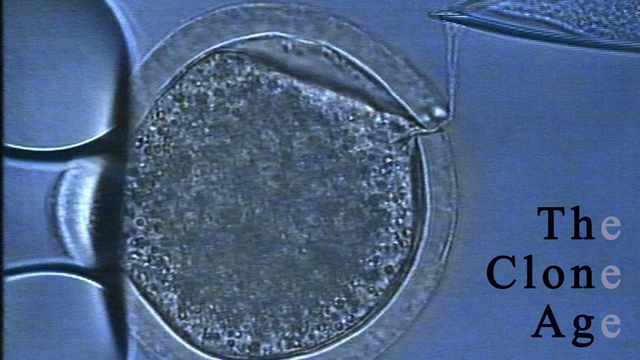Send in the Clones
 Meet Mathilda, a frolicking, happy lamb. But Mathilda is different from all the others. She's Australia's equivalent of 'Dolly', the first cloned mammal. These sheep represent the giant leap that the world of medicine has seen in recent years. Cloning could be the answer to ending debilitating diseases like Parkinson's and leukaemia. But they also represent the more sinister side of technology: the idea that perfect humans can be created --without our help.
Meet Mathilda, a frolicking, happy lamb. But Mathilda is different from all the others. She's Australia's equivalent of 'Dolly', the first cloned mammal. These sheep represent the giant leap that the world of medicine has seen in recent years. Cloning could be the answer to ending debilitating diseases like Parkinson's and leukaemia. But they also represent the more sinister side of technology: the idea that perfect humans can be created --without our help.
"The public needs to be fully aware that what it means is the wholesale use and, in my view, abuse of embryos," Dr. Greg Pike states. He's part of the Southern Cross Bioethics Institute, and knows exactly how Mathilda was produced. The process basically takes the DNA from the cell of a foetus and fuses it with an egg cell which has had the DNA removed. The result is a living creature which is an exact replica of the foetus. But the catch is that after these cells are taken from the egg, the embryo is rendered useless and no more development can occur. Dr. Pike sees this as the direct abuse of embryos - essentially murder.
These experiments may currently focus on creating entire living organisms, but that's not the ultimate goal. Scientists envision cloning as developing into a field specialising in 'spare parts' to replace diseased organs. Cloned livers, lungs, brains, even blood may soon be common in hospital transplants. And if you're a sufferer of a terrible terminal illness all because of one malfunctioning organ, you don't have many opportunities like this one. It's the chance to live your life.
Research on stem cells, the inner mass of cells formed in embryos by day five, may hold the key to curing many of these illnesses. According to Professor Trounson of the Monash Institute of Reproduction and Development, stem cells are the future in cell therapy. They have the ability to turn into any tissue or organ in the body. A process labelled as "therapeutic cloning" allows scientists to direct the stem cells to grow into whatever they want them to be. Combined with other cloning technologies, scientists can even deliver cell types that are identical to the genetic makeup of the patient --meaning no risk of rejection.
But there is a risk to researchers trying to find embryos for their experiments. Trounson has so far been able to get around heavy Australian laws banning embryo destruction - he had to go to Singapore for his embryos, and admits to having used 40 or 50 to get where he is now. In his defense, Professor Trounson insists that Australian law should allow IVF clinics to donate surplus embryos for his type of research. "I live in a state where we throw away hundreds and hundreds of human embryos...we just leave them in the trash can."
Trounson's trials on 40-50 embryos have enabled him to direct stem cells from the early stage straight through to an adult nerve cell. This research has given new hope to people like Lindsay Cremin, once an important police accident investigator with more than 30 years experience. Lindsay now has Parkinson's disease. He wakes up each morning knowing that his tremors have gotten worse. Nerve cells in his brain have lost dopamine, the chemical that controls movement, balance and co-ordination. Lindsay is constantly plagued by the tell-tale shakes that characterise the disease. In the mornings, his condition is almost intolerable since he doesn't take his medicine through the night. If his deadened brain cells were replaced with healthy cells, Lindsay's condition could, hypothetically, be reversed.
Although Dr. Pike calls this embryo abuse, Trounson insists that his "therapeutic cloning" is the best way to use them - there is no option to bring back discarded embryos, but if they can be used to save others, they are doing the world a service. This highly controversial report thoroughly explores the heated cloning debate that is raging through modern medical history.
FULL SYNOPSIS
Produced by ABC Australia
